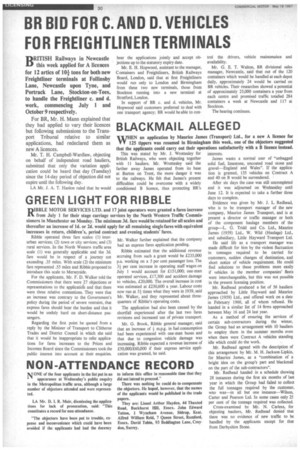BLACKMAIL ALLEGED
Page 32

If you've noticed an error in this article please click here to report it so we can fix it.
WI1N an application by Maurice James (Transport) Ltd., for a new A licence for tippers was resumed in Birmingham this week, one of the objectors suggested that the applicants could carry out their operations satisfactorily with a B licence instead.
This was stated by Mr. J. Wrottesley for interests.
British Railways, who were objecting together with 11 hauliers. Mr. Wrottesley said the farther away James operated from its base at Burton on Trent, the more danger it was to the railways. He felt that James's present difficulties could be overcome with a widely conditioned B licence, thus protecting BR's James wants a normal user of "unbagged solid fuel, limestone, uncoated road stone and gravel—England and Wales". If the application is granted, 135 vehicles on Contract A and 40 on B would be surrendered.
After six days the case was still uncompleted and it was adjourned on Wednesday until June 12. It is expected to take a further three days to complete.
Evidence was given by Mr. J. L. Redhead, who is to be transport manager of the new company, Maurice James Transport, and is at present a director or traffic manager or both of the component haulage members of the group—L. G. Tridd and Co. Ltd., Maurice James (1959) Ltd., W. Wild (Haulage) Ltd., and subsidiary, Little Hayward Transport Ltd. He said life as a transport manager was made difficult for him by the violent fluctuation in tonnages required to be carried for customers, sudden changes of destination, and short notice of vehicle requirement. He could find solutions to these problems more easily if vehicles in the member companies' fleets were interchangeable, but this was not possible in the present licensing position.
Mr. Redhead produced a list of 56 hauliers approached by Little Hayward and Maurice James (1959) Ltd., and offered work on a date in February 1966, all of whom refused. He handed in a similar list of 14 firms approached between May 16 and 24 last year As a method of ensuring the services of certain sub-contractors during the winter, the Group had an arrangement with 10 hauliers to employ them in the summer months even when there were Contract A vehicles standing idle which could do the work.
Mr. Redhead agreed with the description of this arrangement by Mr. M. H. Jackson-Lipkin, for Maurice James, as a "combination of a bright idea on the group's part and blackmail on the part of the sub-contractors".
Mr. Redhead handed in a schedule showing 28 instances during the first six months of last year in which the Group had failed to collect the full tonnages required by the customer, who was—in all but one instance—Wilson, Carter and Pearson Ltd. In some cases only 25 per cent of the tonnage required was collected. Cross-examined by Mr. N. Carless, for objecting hauliers, Mr. Redhead denied that there was no evidence of new traffic to be handled by the applicants except for that from Derbyshire Stone.




















































































































